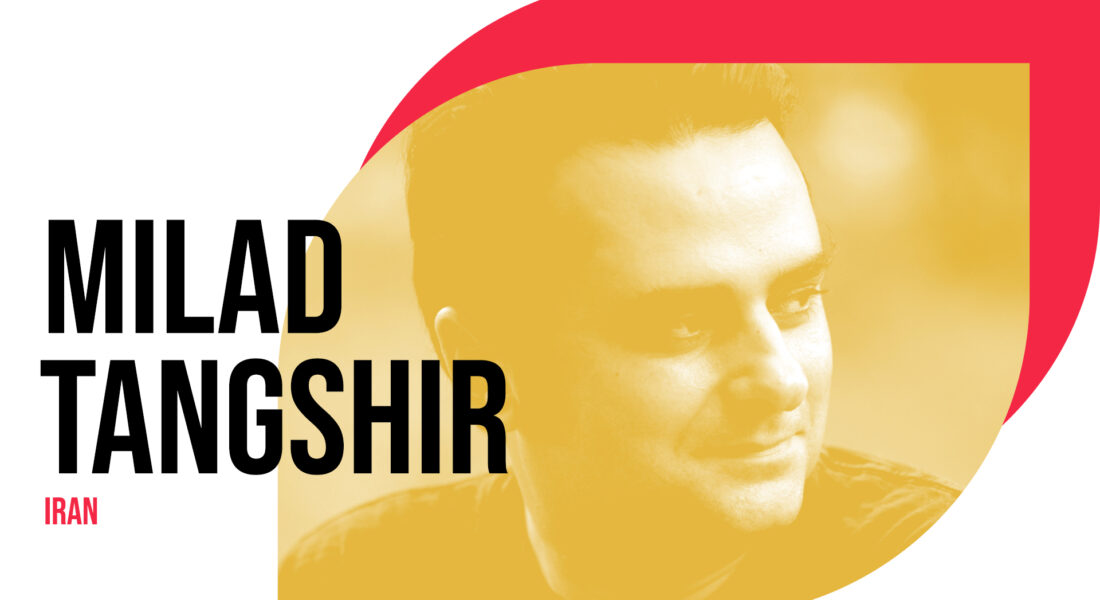
I came to Italy when I was 27, I was already an adult, I came from a different culture, another poetry, and I bring them into my works
Milad was born in Tehran, Iran, in 1983. He speaks “bad Italian,” English and Persian, his native language. He has lived in Turin since his arrival in Italy 11 years ago.
At 18, given a choice, Milad chose college over military service.
After passing the difficult entrance exam, he enrolled in the Bachelor of Science in Mining Engineering program at Azad University, to stay in Tehran and continue his work as a musician there. After graduating, however, he left Iran and moved to Italy, after trying for a few months to learn our language by watching movies and reading books.
Upon arriving in Turin, Milad changed his scientific field and enrolled in Dams, specializing in Cinema, in an attempt to realize another dream of his; in fact, since he was a child, he had been passionate about cinema (thanks to the influence of his father, with whom he had watched films by great directors such as Fellini, Visconti, Antonioni, etc.). In less than a year he had the opportunity to shoot his first short film, thanks to a filming camera provided to him by the University of Turin and thanks to the support of Professor Alonge.
This first work tells the story of a boy eager to make a film, who, not owning a camera, decides to steal it from the university library, but in doing so unintentionally kills the janitor. A semi-autobiographical work, the construction of which took a long time and made the author discover: “the magic of this whole big lie that is cinema (…). I really like the ability of cinema to build a truth through many small technical lies”.
Exceptionally, Milad then finished the three-year course without writing a thesis, but by producing a thirty-minute video essay on Martin Scorsese and his “The Wolf of Wall Street”; “it was the first time a student presented a thesis in this particular format”. His clip, uploaded to Vimeo, was viewed by 50,000 people, much to his delight! The university journey was then crowned by the graduation of his master’s degree in Cinema and Media.
The activity as a filmmaker (which sees him authoring short films, documentaries for cinema, a couple of virtual reality projects, and a few video essays) has no timetable as creation requires complete dedication; moreover, all projects have to be followed in every stage and detail. He is currently engaged in the preparation of a feature film on which he has been working since 2018. He is inspired by the example of great masters such as Scorsese, Fellini, Schroeter, and Kazan.
“The director is a madman who has a desire to tell and express something for which he writes a subject and a script and then looks for producers and collaborators so that he can realize the idea”.
Regardless of the quality of his productions, Milad considers that his scientific-cultural contribution is in the fact that his work is developed here in Italy.
He has often addressed the issue of immigration in his projects because he believes it is important that people like himself, with different cultures and backgrounds, can express themselves by presenting different points of view.
“I came to Italy when I was 27, I was already an adult, I came from a different culture, another poetry, and I bring them into my works”.
In Iran he was not involved in filmmaking, he would not have the peace of mind and freedom of expression to do so, and it was also difficult to make music.
Today, he says he is grateful to Italy, which he consciously chose as his destination. In our country, where he studied, worked and married, he invested his time and dreams and now considers it a bit of home.
Like all those who leave their homeland, he misses his roots, but for now, he does not plan to return.
“Leaving is a psychological trauma, even when you want it very much (…) I have always wanted to travel by moving but I know I am losing friends, family, … years of my parents’ lives away”. When you leave, you “reset everything and start over from the beginning step by step!”
Wishing more serenity and peace for his country, he urges us not to pay too much attention to clichés and to visit and learn about Iran, where “there is great food and a centuries-old poetic culture!!!”


